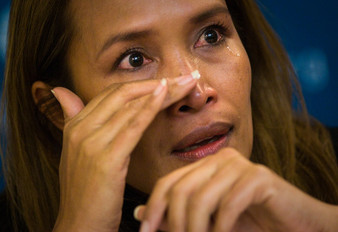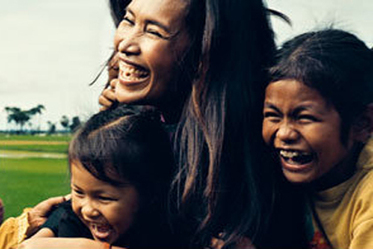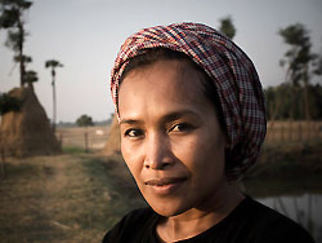
The high-water mark of her accolades is well documented, but it all came crashing down so suddenly this week. Allegations of falsehood in her narrative led her own foundation to hire an independent law firm to conduct an investigation. The results weren’t pretty – an elephant so big it couldn’t be swept under the rug - including concrete evidence from multiple Khmer (Cambodian) sources that confirmed Somaly Mam has been flat-out lying to us the whole time. She was not kidnapped and sold into sexual slavery at age 10, or at all, instead grew up as a normal village girl like so many others. The tale of 10-years of rape, beatings and slavery she told us, which endeared us with their authenticity and brought a tear to more than one blue eye, didn’t happen at all. Furthermore, Somaly lied about her own daughter being kidnapped by sex traffickers as retaliation for her work (she actually ran off with a boyfriend to escape the attention of her mother’s foundation,) and even worse, coached Cambodian girls into telling their own fabricated stories of sexual exploitation to elicit more donations.
Basically, Somaly Mam told us the story we wanted to hear – no, that we needed to hear in order to justify writing big checks. In response, her foundation announced her resignation and is hoping the media maelstrom blows over. Somaly has remained mum on over these allegations but let’s be clear – she lied, and it is wrong. But why? And is there at least some shred of salvation we can locate in all this rubble, considering she’s spent most of her life doing more to combat sex trafficking than anyone on earth? Does she warrant our forgiveness based on the purity of her actions, even if they were wrapped in a banana leaf of lies? I think so, and I’ll tell you why.
First, a quick note about my perspective on this issue; I’ve lived in Southeast Asia over the last year and spent about 4 months of that time in Cambodia, an enchanting black rose of a country that I truly love. I’ve traveled corner to corner, from Kampong Som to Siem Reap, befriending locals, immersing myself in the culture and writing about it. I’ve volunteered at orphanages, visited the slums where people live in and on garbage, slept under the stars in the hot jungle provinces with no electricity, and even lived in a rat-infested abode next door to sisters who work in the sex industry, earning a living in Phnom Penh’s tourist bars. I became like a big brother to them and also became friends with many others and heard their personal stories. I have friends who run charitable foundations here, Khmer friends who work at the Phnom Penh Post, and sipped more than one beer with ex-CIA agents and former royal national guards who’d seen it all. In the meantime, I also wrote a collaborative book, Cambodia’s School of Hope, to help educate and empower youth here. None of that make me an expert on Cambodia but the reality is, I hear more about the true nature of these events on the streets every day than the international media has documented so far, combined.

1.Context.
To start, it’s important to understand that you are looking at this situation through a western or United States paradigm. Of course you are – that’s where you’re from and where you live, so how could you not? It’s a world of black and white, right and wrong, and moral absolutes. But please realize, other people live in a world without the luxury of that same paradigm. I don’t expect you to grasp that right away, but try to keep an open mind as you read what follows.
2. Poverty.
It’s hard for you to even understand the level of poverty in Cambodia. I could throw out plenty of statistics, like the average person makes about $2 a day at a decent job, or there are 90% illiteracy rates in its expansive rural areas, or that it’s so poor, children are frequently sold off for $20 because there’s just not enough food to go around. But all the stats and figures won’t prepare you for the siege of poverty that barrages you when you here. After you see the thousandth barefoot child begging in the street, or whole families picking through the trash, dirtier than the garbage they’re shuffling through, or people with no legs dragging themselves through the streets by their hands, the only reflection they’ll ever see in the shined hubcaps of a politician’s Range Rover, words fall short.
The best way I can describe Cambodia’s poverty is, fittingly, with a quote by Mahatma Gandhi, “There are people in the world so hungry, that God can not appear to them except in the form of bread.”
2. The modern history of Cambodia.
Somaly was reportedly born in 1970 or 1971, her formidable years as a child during the hell-on-earth era of Pol Pot’s regime in Cambodia between 1975-1979, when the Khmer Rouge systematically murdered, starved, or worked to death at least 25% of the population. At least 1.5 million people died in this genocide of “purification,” sometimes for no greater offense than they wore eyeglasses or spoke a little French. The horror was absolute – cruelty unsurpassed in human history. Millions of people spoke only in whispers, made soup from grass and tree bark to survive, ate roaches, rats or earthworms as their only protein source. Mothers watched their babies swung by their legs against trees because soldiers didn’t want to waste the bullet to kill them. High schools and hospitals were turned into carnivals of torture. Mothers, sisters, brothers, and children were raped, mutilated, and killed right in front of you and there was nothing you could say or do about it. After years of that, you didn’t even have tears left to shed. This is the reality Somaly grew up in, and the subsequent decades of hunger, shock, and hopelessness that blanketed the country.
Now, tell me Somaly hasn’t suffered enough - at least to earn our attempt at understanding - without your voice wavering.
3. People act in proportion to their desperation.
It’s important to clarify Somaly’s indiscretion if we are going to pass judgment. Her organization wasn’t a sham, she didn’t cheat people, and funds were not misappropriated. Instead, Somaly’s heinous crime was that she lied – seemingly manufacturing a backstory that was consistent with the victims she was trying to save - to garner funds to help innocent children from being kidnapped, raped, and sexually exploited.
People act in proportion to their desperation, and faced with insurmountable suffering all around her - that the world had forgotten - perhaps she did what was necessary to help quiet the screams. Sit with that for a moment.
4. Culture.
There are acute cultural differences between the United States or the western world and Cambodia that muddy the clear waters of our condemnation. For instance, in Cambodia it’s very rude to directly say, “no” to someone. This often leads to hilarious encounters for the traveller or expatriate as we navigate hundreds of gently deflected mistruths in the name of politeness, like taking 3 left turns instead of a right. I’m not saying that’s the case in Somaly’s situation but I do know there are a lot of cultural differences at play as we translate her narrative into our western consciousness.
5. Corruption.
The mechanics of Cambodia are corrupt to their core – there’s no other way of saying it - as is the case in most poor developing countries. In the modern history of Khmer society, the only absolute most people have known is the daily scramble for survival while a tiny circle of ultra-rich fatten themselves on the sacred cow of their birthright. The deck is stacked and the commoner will always lose. As far as these people know, that’s the way it always has been and how it will always be. You want truth? Power is the only truth in Cambodia, a belly full of rice, the only honesty. No one bothered showing up to work at the Ministry of Justice today, and the Department of Corruption is the nicest building in town. I’ve heard of a general’s wife accepting an award for humanitarian work from the foreign community in the past, while at the same time she was one of the biggest human sex traffickers in Cambodia. Now that we’ve recalibrated the moral spectrum, where does Somaly’s well-intentioned lie rank?

A good story promotes your cause far better than all of the hard work and good intentions in the world. As much as we despise this reality, we equally respond to it. If Somaly were just another poor Cambodian woman crying for the world’s help, would we have listened? Would the international community have picked her up and passed her to the front? Probably not. I know this because I meet people here in Cambodia all the time who do incredible, selfless work to help the disenfranchised but have to close their community centers and suspend operations because of a lack of international attention and funding. A good story is the core, and then you circle your good deeds around that.
This situation reminds me intimately of Greg Mortensen’s dilemma last year, when he fell from grace amid allegations that he fabricated parts of his remarkable story. Author of, Three Cups of Tea, about his near-death experiences in the mountains of Pakistan and Afghanistan that led him to build schools for poor and isolated kids there, he went from best-selling author, media darling, and humanitarian of the year to scorned pariah in the blink of an eye once 60 Minutes and others poked holes in his story.
The world of spin and attention-grabbing headlines is not the same as the real world, yet we continue to canonize our heroes and drag our villains through the streets of public opinion, quickly forgetting why we loved them in the first place. How quickly we abandon the pure causes they championed in order to join the rabid mob.
To put the ultra-competitive, cutthroat world of NGO’s (non-governmental organizations) in context, probably the biggest and most popular charitable org here is the Cambodian Children’s Fund, founded by Australian Hollywood movie mogul, Scott Neesun. Here is his story:
Scott was one of the most successful people Hollywood, President of 20th Century Fox International, and had the wealth and privilege to prove it. But in 2003, on a trip to Cambodia, he came across the garbage dumps of Steung Meanchey. There he witnessed a little 9-year old girl, barefoot and dressed in rags, picking through broken glass and syringes looking for food or something of value to sell. Through an interpreter he found out that she lived there among the trash with her sister and mother, and that’s how they survived.
Despite all of Scott’s money and accomplishments, he just couldn’t turn his back on that little girl, and all the kids born into those same circumstances in Cambodia. So he walked away from his star-lit Hollywood life and instead dedicated himself to helping those children. Since 2004, Neeson's charity has helped house, educate and provide health care for more than 1,450 children in the country's most desperate slums.
Great story, huh? I’m sure Scott is a great man and does great work, but there’s no coincidence that his ultra-marketable riches-to-rags story helped propel his organization a lot faster than if he was just another caring tourist.
There’s a corollary to this story that will conclude my point. I do some charity work with a wonderful school here in Cambodia, the Spitler School in a poor village outside Siem Reap. American businessman, Danny Spitler, and his wife founded it about 8 years ago after they visited Cambodia and had a similar epiphany as Scott Neeson. They started funding a humble school in the village along with a caring local man, which has grown into two large school compounds that help educate and empower over 800 children a year, every year. But Danny doesn’t have a slick PR campaign and a Rolodex filled with Hollywood insiders so the marketing has lagged behind the angel’s work they do. We just released a collaborative book, Cambodia’s School of Hope, to remedy that problem, but you get my point – marketing is storytelling, and there’s no playing field where it’s more important than non-profits and fundraising.
7. Great people have great flaws.
Some of the greatest people in history are megalomaniacs, passionate to a fault, hurtful to those around them, and have egos the size of beach balls. Think of Steve Jobs, Pablo Picasso, and the archetype of just about any other eccentric genius throughout history. The same personality traits that lead people to greatness manifest as great flaws. I think it’s important to tolerate the flaws if we celebrate the greatness. Perhaps, Somaly is one of those people.
8. Who are we to criticize?
What have we done to help the little girls being raped and sold into sexual slavery in Cambodia, or anywhere? What do we do for charity? What have we sacrificed? Are we quick to criticize but slow to act? Let me put this as delicately as possible…if you’re licking your chops to criticize Somaly but not doing a whole lot to make this world a better place, then shut the hell up and go away.
9. Are we innocent?
If we want to start stacking stones of right and wrong on the scales, let’s make sure they’re all up there. The United States has done plenty of terrible things in this part of the world and hurt countless innocent people for the sake of money, power, or ideology, many of which I never realized until I came here and saw with my own eyes. We’ve also done a lot of good things that genuinely help people. But Asia is a maddeningly complex theater of the world where everyone is guilty during some act. So before we point fingers at Somaly, one poor Cambodian woman who’s guilty of being overzealous to rally the world’s attention around the pure cause of defending children - let’s make sure our own hands aren’t dirty, too.
10. Would you do the same?
If you were faced with these same conditions and circumstances, and you honestly thought that to make a real difference in these girl’s lives you had to exaggerate a backstory, would you lie to help them? Would you perpetrate a small wrong to achieve a whole lot of right? Would you do the same as Somaly?
Based on that paradox, would it have been unlawful for her not to lie, if it meant she wouldn’t be empowered to help all of those women and girls?
I don’t know what the right answer is. Or, I guess the whole point is that there's not one right answer, but I do know this; Somaly, in all of her flaws and faults, indiscretions and imperfections, has done more to spread light than most of us, myself included, will do in 100 lifetimes. Yet, we find ourselves in this unfortunate place because she did violate our trust, and trust is perhaps the one thing worth more than money - something so precious and fragile, it’s rarely recoverable.
But if you could look into the eyes of the Cambodian girls she’s rescued, hear there joyful voices say, “arkoun, ohn,"– “thank you, sister,” to Somaly, you’d realize it’s not the only thing.
-Norm :-)
 RSS Feed
RSS Feed